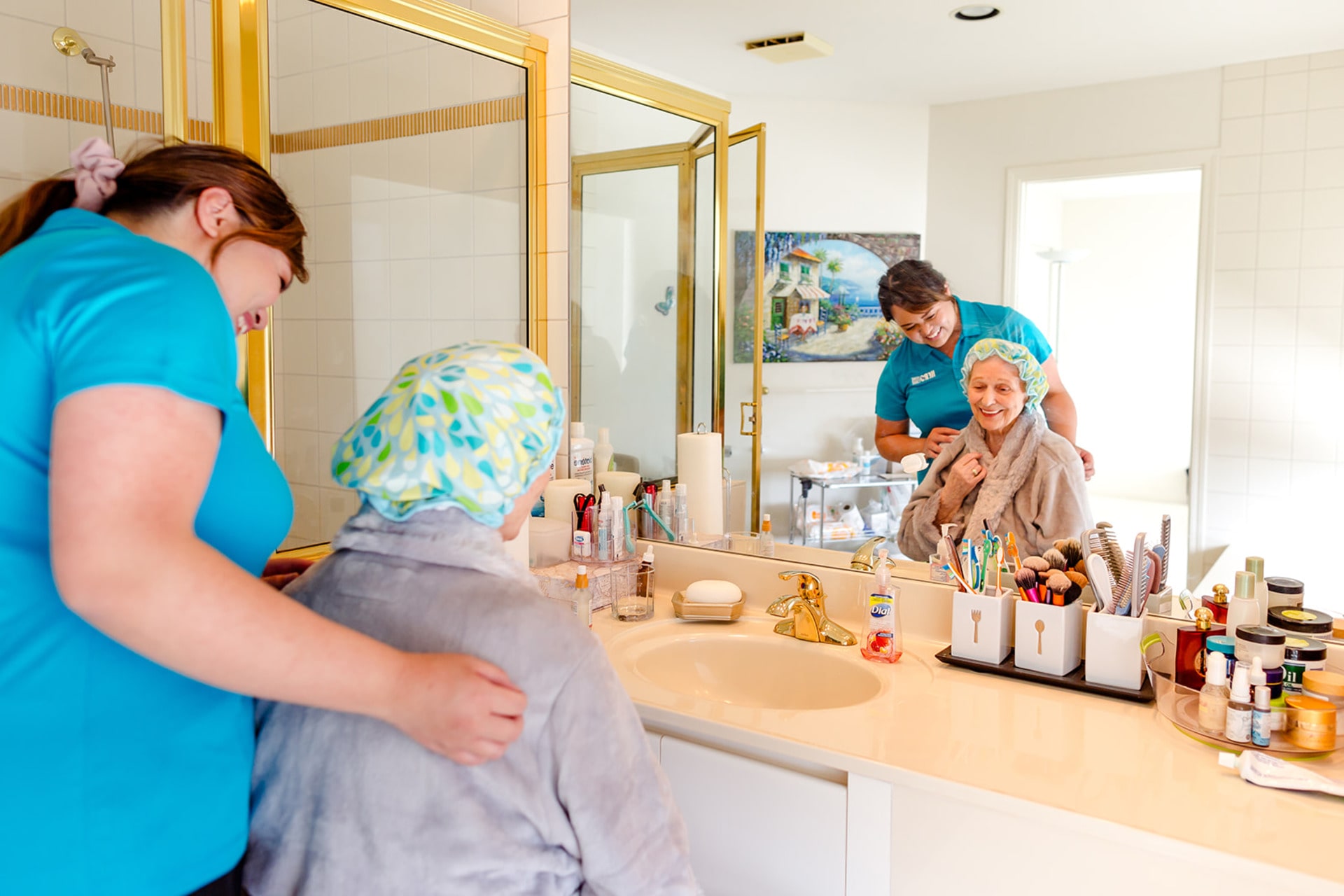A hospital stay can be stressful and uncertain for anyone, especially a senior. Preparing to be discharged from the hospital is usually welcomed but can also cause additional stress for the patient and their loved ones.
Your loved one will likely have a lengthy recovery at home, and it’s your responsibility to help make sure their home is ready and safe for their return.
To help you and your loved one transition safely back home after their hospital stay, follow our guidelines for safe home transfer for seniors.
Preparing for discharge and returning home
As you and your loved one’s doctor prepare for discharge, discuss how they’ll return home and what support they’ll need as they settle back into their home life.
You may need to arrange for safe transportation from the hospital to their home. If they are not ambulatory, they may require a wheelchair van. If they’re connected to any equipment, such as an IV machine or specialized medical equipment, you may need specialized ambulance-style hospital transportation. Your doctor can likely recommend transportation services that serve your area.
Home care requirements
Talk to your loved one’s doctor about home care instructions so you can prepare before they come home. You want to ensure their home is safe and promotes optimal healing and health.
While hospital readmission rates in BC remain lower than average (at about 9.4%), without the proper care, your senior loved one could re-injure themselves and end up in the hospital again. They’ll likely need extra care and support, especially in the first few days, so you need to assess whether you are prepared and able to provide this care.
What are their unique care needs?
Talk to their doctor about any special care needs when they get home:
- Ask a hospital nurse to show you how to use special medical equipment like oxygen tanks and IVs.
- Confirm any medication and prescriptions.
- Ask about the rules for providing other over-the-counter medications if needed.
- Ask about special dietary needs or restrictions, especially anything that will interfere with the effectiveness of medications.
- Ask about follow-up appointments.
Do you require in-home care?
You may want to hire an in-home care aid, domestic support, or an in-home nurse. These professionals can provide occasional, full-time,or around-the-clock care for your loved one.
In no specific order, here are the top five reasons you should choose an in-home care aid when your aged loved one comes home from the hospital:
- You get professional-level care (especially medical support) you can’t provide on your own.
- They can provide care relief support for family members (so you can focus on yourself, too).
- They can give domestic support around the home (such as cleaning up and basic yard maintenance).
- They can drive your loved one to medical appointments when you can’t.
- They are specially trained in providing dementia or Alzheimer’s care and supporting clients who need extra mental health support.
How to prepare their home for return
After you have arranged for transport home and hired someone to provide in-home support, it’s time to look around their home to prepare for their return. Here are a few things to consider:
- Do they have comfortable (clean) clothes? Make sure they’re easy to put on.
- Do they require any special equipment (including non-slip pads in the shower, new support railings installed, supports for the toilet, or ramps)
- Remove any tripping hazards (like carpets or furniture that overhangs walkways)
- Ensure the yard is tidy and cared for (so your loved one doesn’t have to stress about weeding or cutting the lawn while they recover)
- Bring daily-use items down from high shelves to be within comfortable arm’s reach.
- Stock the fridge with fresh food and drinks.
- Bring home some new games or activities your loved one enjoys. For example, if they’re an avid puzzle-maker, buy them a new puzzle and have it set up for when they arrive.
- You may also want to make the home more relaxing with a bouquet of flowers or a new plant. Little personal touches like these will help your senior loved ones feel at home.
Hire a home care agency before they are discharged
We know you have a lot on your to-do list and may be stressing about getting everything done before your loved one comes home. Did you know that you can hire a home care agency to come to the home to get everything ready in advance? They can do a home needs assessment with you and suggest ways to make the home safer. They can also help you clean and prepare the home for their arrival.
Their first days/weeks at home
Once your loved one returns home, the whole family may still feel uneasy or nervous, especially leaving their loved one alone without support. The house contains many dangers, especially for someone with mobility issues or who is recovering after a hospital stay.
On the other hand, increased needs and demands may require more time, care, and attention for your loved one. Latest studies show that family caregivers provide, on average, over 1,300 caregiver hours per year, with some providing 36 hours or more per week. These hours can increase, especially after hospital discharges, which can ultimately lead to burnout and a drop in the caregiver’s mental health and well-being.
This is why many families choose the peace of mind with a trained, professional caregiver in their home. Here are a few ways this professional can help keep your loved one safe:
- Personal care: Your loved one will likely need help with daily hygiene tasks like bathing, eating, dressing, and toileting. A caregiver is specially trained to assist with these tasks.
- Household care: They will likely need support around the home. This may include cooking healthy meals, cleaning up, doing laundry, and grocery shopping. A caregiver can follow any doctor’s nutritional advice and recommendations.
- Medical health care: A trained nurse or caregiver can provide medical care and monitoring. Medically trained caregivers can support your loved one with medication management, taking them to medical appointments, supporting physical therapy, treating wounds, providing injections, maintaining medical equipment, and providing health monitoring.
- Emotional companionship: Having someone to talk to or around the house after a lengthy hospital stay can provide much-needed social-emotional support for your recovering elderly family member. In addition to providing much-needed physical and domestic support, good caregivers can participate in activities and conversations with their patients.
What is your at-home care plan?
With a thorough home care plan, you can help minimize chances of re-injury (and associated hospitalization or increased recovery time) and support the social-emotional needs of your aged loved one. They will require extra care during this critical time, and it may be more than you can provide.
This is why we suggest hiring a home care agency, like Hero Home Care, to support you and your loved one after they return home from a hospital stay. These heroes are dedicated to meeting all of your loved one’s needs while they focus on recovery. Whether they need more advanced medical support and monitoring at home or are ambulatory and need emotional companionship and support, an in-home caregiver is ready to help.
As you prepare for your loved one’s discharge from the hospital, give us a call. We can meet you and your aged loved one in the hospital for a meet-and-greet and in your home to help you prepare for returning home. We can support you as long as you need, whether it’s a few hours to get settled, a few weeks during recovery, or 24 hours a day, longer term, for more in-depth care.

